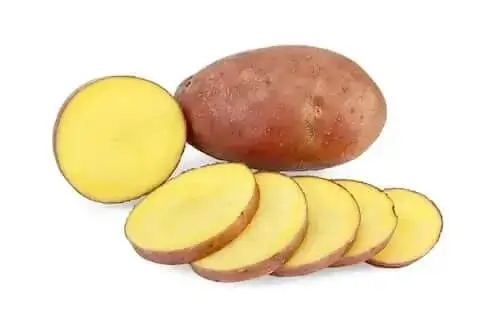Potato Nutrition
Potatoes are almost a must-have for anyone who plans on building a good diet plan. A medium sized piece of this starchy, tube crop only has 110 calories and completely free from any kind of fat, sodium or cholesterol. Plus, potato nutrition says it’s also a good source of a lot of nutrients that are…
This post may contain affiliate links. Please read our disclosure policy.
Potatoes are almost a must-have for anyone who plans on building a good diet plan. A medium sized piece of this starchy, tube crop only has 110 calories and completely free from any kind of fat, sodium or cholesterol. Plus, potato nutrition says it’s also a good source of a lot of nutrients that are essential to a healthy body.
For instance, did you know that potatoes are a rich source of potassium? In fact, it’s got even more potassium than the most popular fruit source of this mineral known to most people – bananas. A medium sized potato has as much as 620 milligrams of potassium. That’s 18% of the average recommended amount daily with each serving. This is why potatoes rank the highest among all vegetables and fruits that are consumed raw as a potassium source.
Potassium helps lower one’s blood pressure. But because a person needs as much as 4700 milligrams of potassium each day, not everybody gets enough. Potatoes, however, can make it all easier.
Potatoes are also an excellent source of vitamin C, a very well-known and much sought after vitamin everywhere. Vitamin C helps boost the immune system, improves absorption, collagen production, prevent cellular damage, wound healing, and even keep your gums healthy. Compared to medium sized tomatoes, which contain 40% of the recommended daily value, and the sweet potato (only 30%) potatoes have enough vitamin C to satisfy 45% of the recommended daily intake, which means having 2 medium sized potatoes in your daily meals alone will give you enough vitamin C that you need.
Need help with digestion and weight loss? Your body needs fiber, and potatoes have lots of them. Potato nutrition shows that a single serving gives 2 grams of serving – that’s 8% of the recommended value each day. Fiber is great for making your body feel full (making you want to eat less), and help lower one’s blood cholesterol.
Here’s another vitamin that most people are familiar with: B6. They play an important role in the metabolism of carbohydrates and proteins, as well as produce non-essential amino acids to process proteins. It also plays a part in producing hemoglobin – an important component of red blood cells. Potatoes are a very common source of B6, each serving having as much as 10% of the recommended daily value.
Potatoes also have as much as 6% of the recommended daily value of iron, which is helps in the overall development of one’s cells. Deficiency in iron could affect various body functions and cause anemia.
But the best part about potato nutrition is that it’s so easy to integrate into one’s diet. There are so many ways to either prepare potatoes as a dish, and even more ways to add them to your favorite meals. This means anyone can benefit from having a good amount of potatoes without changing their daily menu.
As a final note: make sure you include the potato’s skin. The skin alone possesses 20% of the entire potato nutrition. It’s also where most of the fiber is found.




Leave a Comment